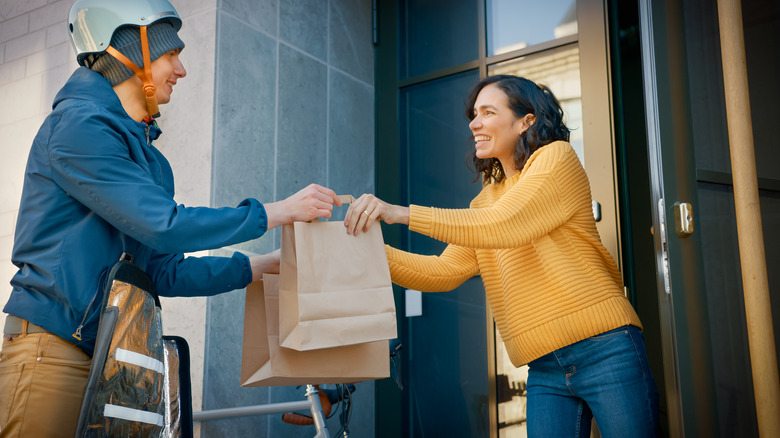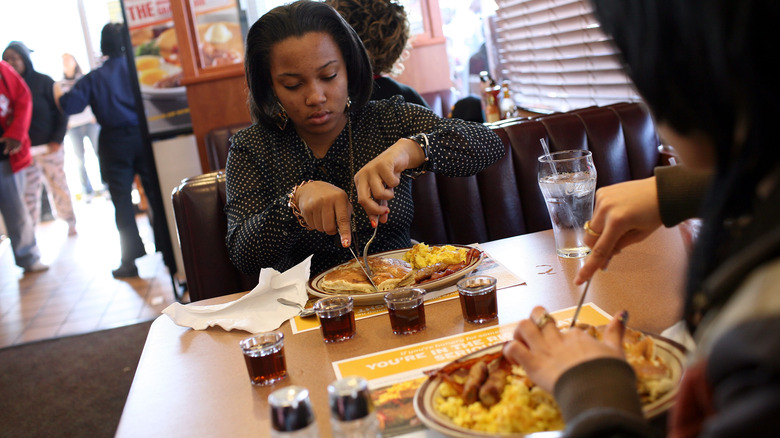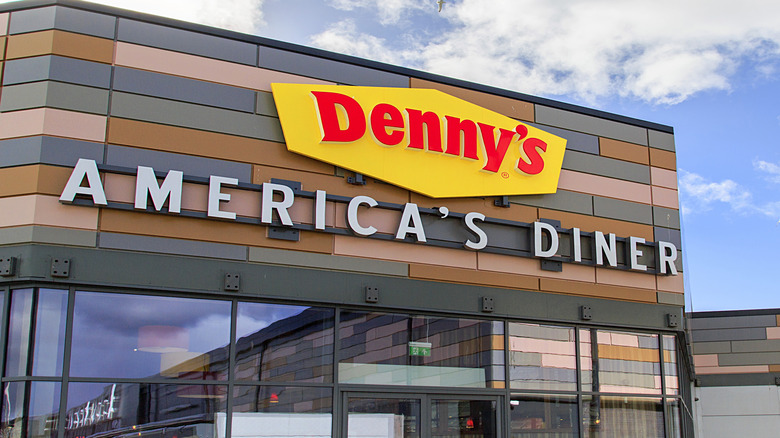The Denny's Delivery App Fact That's Honestly A Little Shady
Delivery apps like Uber Eats and DoorDash are perfect for those nights when you don't feel like cooking. And new restaurants are popping up on these apps every day, which allows users to support small businesses and sample new fare. But consider that some of those establishments may not be what they appear and may even be existing brands. Take Denny's, a diner chain known for its no-fuss menu and 24-hour schedule (at least at certain locations).
Among the things customers might not know about Denny's, many patrons are unaware that the restaurant operates two virtual brands. The Meltdown and The Burger Den feature food prepared within Denny's kitchens and are only available when ordering food via a delivery app. However, app users can't easily determine the Denny's link, as both establishments feature unique branding. This practice can be highly frustrating for customers, as illustrated by comments posted on Reddit. As one person stated, "I just was tricked into ordering Denny's ... Not only would I not have paid 18 [dollars] for a Denny's melt, I feel totally scammed because I thought it was a local, higher end place."
Is Denny's taking part in the ghost kitchen trend?
One could say that Denny's is taking advantage of a trend that began to pick up speed during the pandemic. For those unaware of what a virtual kitchen is, ghost kitchens — or cloud or dark kitchens, as they're also known — offer items that can only be ordered through delivery apps. In some instances, a digital brand may set up in an existing commercial kitchen. In others, a brand may establish a space to prepare and cook food. Ghost kitchens are often created by small business owners who want to get a foothold in the restaurant industry but lack the capital to do so.
This appears not to be the case with Denny's, an established brand, which has led to accusations of shadiness. Just consider pricing: As reported by CBS News, The Meltdown offers customers the same sandwiches available at Denny's. However, the names of the sandwiches and pricing schemes differ, even though they feature the same ingredients. For example, a Brisket Melt is $2.03 more from The Meltdown — where it's called a "Giddy Up Melt" — than it would be if ordered from Denny's. That means that the chain is not only concealing where food is being made but is also taking the opportunity to charge more for it.
Denny's is forthcoming about its online delivery concept
While delivery app users don't appreciate being duped by Denny's, it should be noted that the chain is open about its branding efforts when it comes to its ghost brands. Speaking with Food on Demand, the chain's vice president of product innovation, Sharon Lykins, said the adoption of virtual brands simply allows Denny's to capitalize on "what we do well." This is in reference to the type of ingredients Denny's uses in its menu items, as well as the fact that many locations are open 24 hours (meaning that staff are available to fulfill orders day and night). Lykins also stated that the development of virtual brands enables the restaurant to pursue a younger demographic.
And that may be where the real shadiness lies. Per CBS News, one patron duped into ordering from The Meltdown claimed to have avoided the virtual brand after realizing it was a re-brand of Denny's. Delivery apps have also expressed consternation about the proliferation of virtual brands, including Uber Eats and its effort to crack down on ghost kitchens. It's not clear where Denny's virtual offshoots are headed, but delivery app users should remain alert if they want to avoid this divisive marketing tactic.


